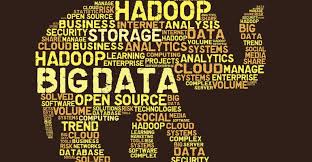
What is Hadoop?
Apache Hadoop is a 100 percent open source framework that pioneered a new way for the distributed processing of large, enterprise data sets. Instead of relying on expensive, and different systems to store and process data, Hadoop enables distributed parallel processing of huge amounts of data across inexpensive, industry-standard servers that both store and process the data. With Hadoop, no data is too big data.
Why Big Data Hadoop?
In a fast-paced and hyper-connected world where more and more data is being created, Hadoop’s breakthrough advantages mean that businesses and organizations can now find value in data that was considered useless.
Organizations are realizing that categorizing and analyzing Big Data can help make major business predictions. Hadoop allows enterprises to store as much data, in whatever form, simply by adding more servers to a Hadoop cluster. Each new server adds more storage and processing power to the cluster. This makes data storage with Hadoop less expensive than earlier data storage methods.

How Big Data and Hadoop is changing the life for a real company :
Hadoop is a miracle for the large MNCs to small startups. Hadoop helps businesses store and process massive amounts of data without purchasing expensive hardware.It has changed the life of big giants and enables a large ecosystem of solution providers such as log processing, recommendation systems, data warehousing, fraud detection, etc
Yahoo is using Hadoop for content optimization, search index, ads optimization and content feed processing. Biggest development has happened in the media industry, one of the renowned newspaper, New York Times uses Hadoop to make PDF file from published articles. Many popular E-Commerce companies are using Hadoop to track user behaviour. Hadoop is answer to the traditional storage & computing problem. Traditional Database management systems are not scalable, not fault tolerant and become very slow in fetching record as the data size increases.
Hadoop is also used in other departments like customer segmentation and experience analysis, credit risk assessment, targeted services, etc. Machines generate a wealth of information–much of which goes unused. Once you start collecting that data with Hadoop, you’ll learn just how useful this data can be. For instance, this recent webinar on “Practical Uses of Hadoop,” explores one great example. Capturing data from HVAC systems helps a business identify potential problems with products and locations.
Here’s another great example: One power company combined sensor data from the smart grid with a map of the network to predict which generators in the grid were likely to fail, and how that failure would affect the network as a whole. Using this information, they could react to problems before they happened.
The reason for Hadoop’s success in the banking and finance domain is its ability to address various issues faced by the financial industry at minimal cost and time. Hadoop addresses most common industry challenges like fraud, financial crimes and data breaches effectively. Analyzing point of sale, authorization and transactions, and other points, banks can identify and mitigate fraud. Big Data also helps in picking up unusual patterns and alerting banks of the same, while also drastically reducing the time and resources required to complete these tasks.
Assess risks accurately using Big Data Solutions. Hadoop gives a complete and accurate view of risk and impact, enabling firms to makes informed decisions by analyzing transactional data to determine risk based on market behavior, scoring customers, and potential clients.
Protection, easy storage and access of financial data are the optimal needs of banks and finance firms. While Hadoop Distributed File System (HDFS) provides scalable and reliable data storage designed to span large clusters of commodity servers, MapReduce processes each node in parallel, transferring only the package code for that node. This means information is stored in more than one cluster but with additional safety to provide a better and safer data storage option.
Bank need to analyze unstructured data residing in various sources like social media profiles, emails, calls, complaint logs, discussion forums, etc. as well as through traditional sources like transactional data, cash and equity, trade and lending, etc. to get a better understanding of their customers. Hadoop allows financial firms to access and analyze this data and also provides accurate insights to help make the right decision.
Hadoop is also used in other departments like customer segmentation and experience analysis, credit risk assessment, targeted services, etc.